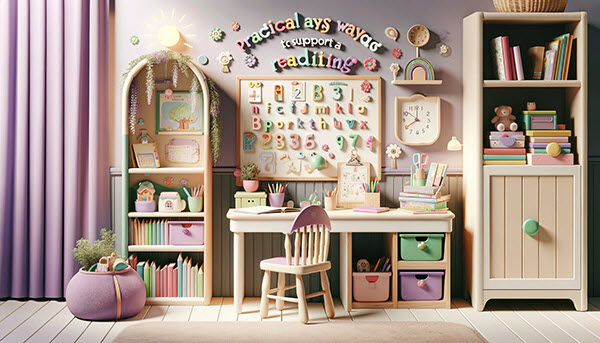Help for Child Struggling with Reading and Writing: Identifying Struggles and Offering Solutions
Watching your child face difficulties in reading and writing can be deeply concerning for any parent.
We look into why these struggles are often interconnected and how addressing them together can lead to significant improvements.
We’ll explore common causes, identify key signs of issues like dyslexia, and offer practical advice and fun activities to support your child’s journey towards becoming a confident reader and writer.
Whether you’re just starting to notice challenges or are considering professional intervention, this article provides the insights and tools you need to help your child succeed.

Understanding the Link Between Reading and Writing Struggles in Children
We all want our children to succeed, and it’s heart-wrenching to watch them struggle with reading and writing.
Recognizing the connection between these difficulties is crucial because these foundational skills are deeply intertwined. Struggling readers often face hurdles as writers as well, since both roles require a strong grasp of language and comprehension.
A child’s hesitation to read aloud or reluctance to engage in writing tasks could be signs of deeper issues.
Addressing both reading and writing simultaneously not only strengthens their academic abilities but also boosts their confidence across all subjects, helping them become proficient readers and skilled writers. For further guidance on supporting your child’s reading development, consider exploring our article on effective strategies to assist struggling readers.
Common Causes Why Children Struggle with Reading and Writing
If you’re puzzled about why your child is struggling with reading and writing, you’re not alone.
Often, the root of these challenges stems from inadequate or mismatched instructional methods, particularly because they’ve received poor or inadequate reading instruction, which fails to align with a child’s pace or learning style. Additionally, undiagnosed learning disabilities, a lack of engaging reading materials, or insufficient practice at home can exacerbate these struggles.
It’s crucial to assess not just the educational environment but also external factors like emotional stresses that could distract or hinder their ability to focus on learning. Understanding these aspects can be key to helping your children overcome their difficulties in reading and writing.
Identifying Signs of Dyslexia and Other Reading Struggles
Does your child confuse similar letters, or struggle to sound out words? These are common indicators of dyslexia or other reading difficulties.
Pay attention if your child avoids reading tasks or shows frustration, as these signs often point to struggles that could affect their academic and emotional development.
When children struggle with reading, it may also impact their ability to read and write coherently. Signs like poor spelling or disorganized thoughts on paper in their writing can also suggest related challenges. Recognizing these early can pave the way for timely and effective interventions, turning potential setbacks into opportunities for growth and learning.
Practical Ways to Support Your Child’s Reading and Writing Skills
Supporting your child in reading and writing doesn’t have to be a chore.
Choose books that align with their interests and reading level to foster both enjoyment and confidence. Engage in daily reading and writing activities (like journaling about their day or creating simple stories) which can significantly enhance their reading skills. Additionally, if your child struggles, incorporating educational games that focus on reading and writing can transform these essential skills into an enjoyable learning experience, keeping frustration at bay and motivation high.
These strategies ensure that your child continues to read, write, and progress effectively.
Engaging Activities to Improve Reading Skills: Choose Books at Your Child’s Level and Make It Fun with Games
Selecting the right books and incorporating fun activities are key to improving your child’s reading skills.
Start with books that match their current level to ensure they feel successful and encouraged. Introduce games that blend reading with play, such as word matching or story sequencing, to enhance comprehension and quicken reading retention.
This approach not only makes reading more enjoyable but also embeds these skills more deeply through engaging and interactive experiences.
If your children struggle with reading, these methods can be particularly effective in maintaining their interest and boosting their proficiency.
When to Consult a Professional for Your Struggling Readers
Watching your child struggle with reading can be heart-wrenching, but knowing when to seek professional help is crucial. For guidance on identifying early indicators, check out our article on the five warning signs that a student may be facing reading challenges.
If your child’s challenges in reading and writing persist and start affecting their self-esteem or progress in other subjects, it might be time to consult a specialist.
Early intervention from a professional can provide specialized strategies and support for issues like dyslexia, helping your child overcome their difficulties more effectively.
If you’ve tried various supportive strategies and yet they continue struggling, reaching out for professional guidance can make a significant difference in your child’s educational journey. Such steps ensure that your child gets the help needed to read, understand, and excel academically.
Conclusion
Addressing reading and writing challenges together is vital for building a strong foundation for your child’s academic success.
By integrating these skills, you can enhance their learning experience and help them make quick progress in reading and writing. As you implement the strategies discussed, remember the importance of patience and consistency.
Every child’s journey is unique, and your steadfast support is crucial to their development.
We encourage you to share your experiences and successes in helping your child overcome these challenges. Your stories can inspire and assist other parents navigating similar paths, and together, we can help our children thrive in reading and writing.
If you’re wondering about the long-term outcomes, read more about whether struggling readers eventually catch up in our detailed analysis.

Natalie is a full-time blogger and former elementary school teacher who specializes in helping parents teach their kids to read. With a qualification in Early Childhood Education, over 7 years of experience in education, and a passion for literacy, Natalie provides practical tips, activities, and resources for parents looking to support their child’s learning-to-read journey. She is the proud mom of two young readers and loves sharing her knowledge and experience with other parents. Natalie enjoys spending time with her family, reading, and exploring the great outdoors when she’s not blogging.

